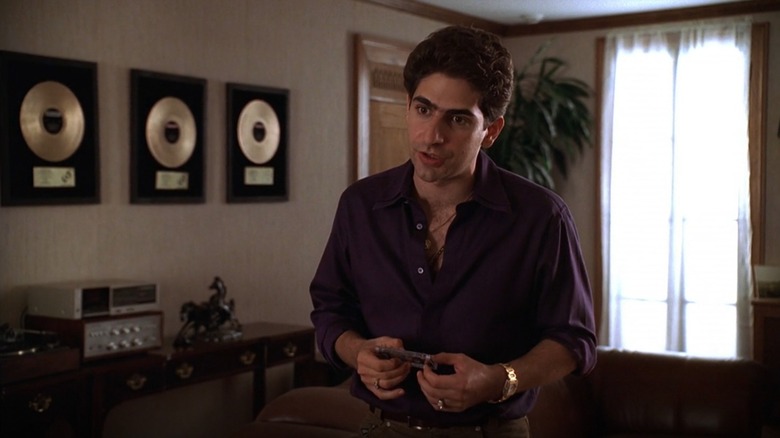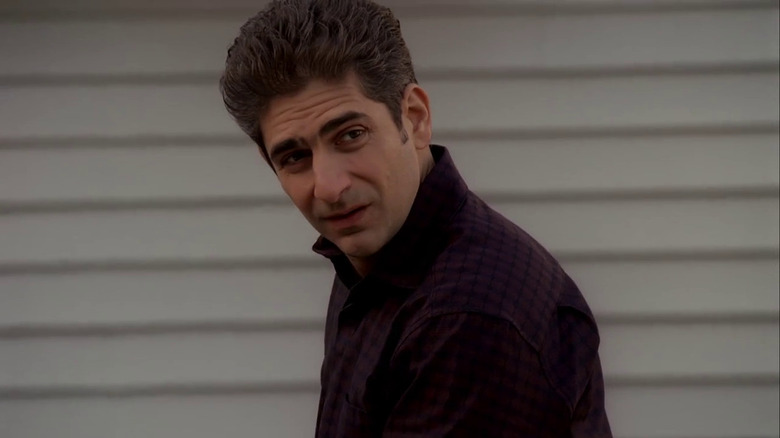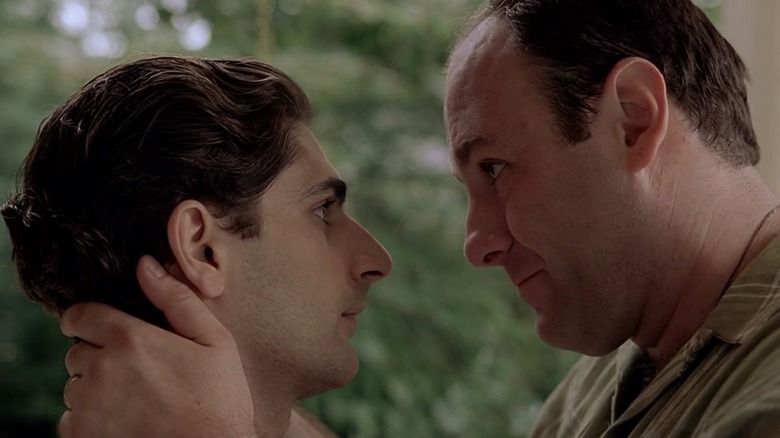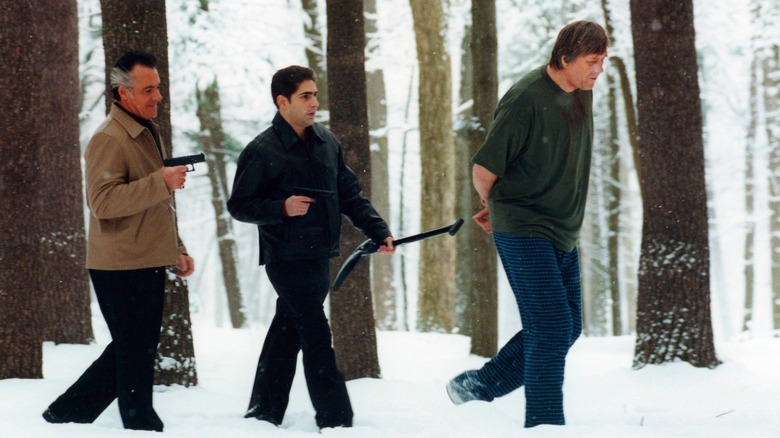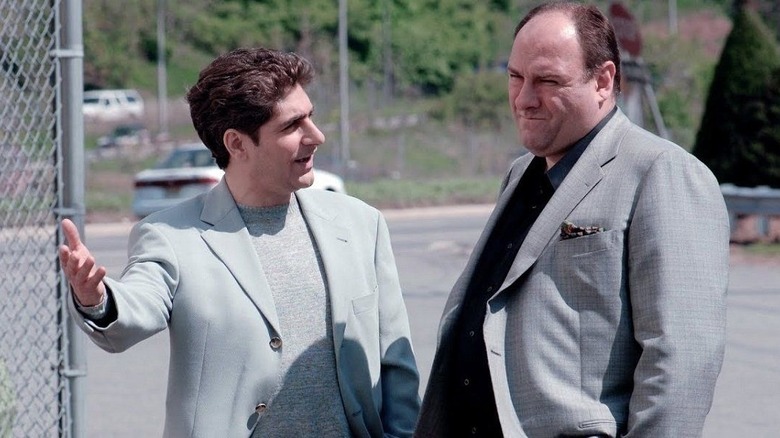The Real-Life Man Behind Michael Imperioli's Christopher On The Sopranos
The characters in "The Sopranos" might be the invention of series creator David Chase, but that doesn't mean that he and the cast didn't draw inspiration from real life. Several of the best characters in the show are loosely based on real mobsters and tough guys from the old neighborhood. Michael Imperioli's character Christopher Moltisanti was not written with a notable real-life counterpart in mind, but the actor did draw on someone he knew growing up to help him better understand and perform the role.
Tony Soprano and his cohorts were obviously inspired by the real-life mafiosos of New York and New Jersey. While series creator David Chase hasn't named any names — he's no snitch — some actual criminals have parallels to the "Sopranos" characters. For instance, Anthony "Tony Boy" Boiardo of the New Jersey crime family also attended therapy sessions to manage anxiety, per The New York Post. While Chase hasn't gone into specifics, he admitted that his series is loosely modeled after one family in particular.
"90 percent of [the show] is made up," he told New Jersey Monthly in 2002, but the series creator "used some of the place-names and family names of people in Essex County, and it's patterned after this other [family]. I probably shouldn't even mention their names because I think they're out of it now. [...] They were a very large crew of a New York family, and that's who 'The Sopranos' is loosely based on."
Chase wasn't the only one on the "Sopranos" set that drew from real mobsters for inspiration. Imperioli found his own creative influence in a hometown friend, whom he channeled in his performance as Christopher.
Imperioli modelled Christopher after someone he grew up with
Imperioli grew up in a New York suburb much like the New Jersey town where "The Sopranos" is set. The actor was born in Mount Vernon before moving upstate to Brewster at age 11, per The Wall Street Journal. Along the way, he met some people that would've fit right into the world of "The Sopranos" and he used them to inform his own character on the show. One acquaintance, in particular, bore a lot of similarities to Christopher, both in the script and in what Imperioli brought to the role.
"Well, there were some very literal things that — the parallels like being from kind of — not New Jersey but a similar kind of New York-adjacent, you know, kind of place, addictive things and brushes with the mob," he explained on NPR's Fresh Air. "He wasn't a mobster, but there were — he had some brushes with them."
It wasn't this man's addiction or criminal connections that informed Imperioli's performance, though — it was his theatricality.
"[...] [T]his person, who I knew when I was a lot younger, was very hyperbolic in his expression of emotions to the point where sometimes I wasn't sure if he was acting or not," the "White Lotus" star added. "He was very big that way. You know what I mean? Like, when he — especially when he felt he was being slighted or, you know, expressing injustice, feeling that kind of thing, which Christopher always felt like [...] He was unappreciated and being slighted[.]"
The actor was afraid of being over-the-top
Playing Christopher as an over-the-top hot-head was a gamble for Imperioli. He wanted his character to feel real, which is why he decided to take inspiration from a real-life person's behavior. At the same time, since that person was so theatrical, he ran the risk of looking like a bad actor that couldn't subtly articulate his character's emotions. But Christopher is not a subtle guy, and to play him as such would have been a disservice.
"[...] [This person] would express [his anger] so — in such a huge way, totally uncensored, that I would always be, like — it almost looked like a performance and — which is a little bit risky to do as an actor because you don't want it to seem like a performance, right?" he continued. "You want it to seem real, but [...] But that was who he — that's who the character was."
Imperioli wasn't the only actor on "The Sopranos" set that drew from people they knew to play their characters. Lorraine Bracco, who plays Tony's therapist, Dr. Melfi, brought her own experiences with therapy into her role.
"I had two psychiatrists in real life, and I stole from both of them," she told Imperioli and co-star Steven Schirripa for their oral history of the series, titled Woke Up This Morning.
But it wasn't just the actors that drew from real-life people to expand upon their characters. Chase claims to have based the same role on his own psychiatrist, a woman who coincidentally shares Bracco's first name. "Melfi was based on a therapist that I went to," he added. "That's who she was. She was very much like that therapist, a woman named Lorraine Kaufman, whose husband, Millard Kaufman, wrote [the Western film] 'Bad Day at Black Rock.'"
Some Sopranos cast members inspired their own characters
Some of the "Sopranos" cast members also served as inspiration for the show's writers and deeply informed the roles they played — particularly Tony Sirico, who plays the curmudgeonly but ever-loyal Paulie Walnuts. In fact, the part was made specifically for him. He initially auditioned for the role of Uncle Junior and, when he didn't land it, the series creator wrote a new role tailor-made for him.
Chase called the actor and said, "'I've got something in mind for you. I want you on the show. I haven't decided what you're gonna do or who you're gonna be,'" Sirico recalled on Today. "He hung up — I wasn't sure if he was pulling my pretzel. [...] An hour later he calls me up and he says 'You are Paulie Walnuts, you're on the show.'"
Many elements of the character were modeled after Sirico, including Paulie's living space. "There was an episode where they were going to go to Paulie's apartment, and the set designers and producers were racking their brains to figure out what the apartment would look like," Schirripa recalled (via Woke Up This Morning). "Finally, somebody said, 'The guy is the guy. Let's go to Tony Sirico's apartment.' That's what wound up being Paulie Walnuts's apartment. It was an exact replica of Tony's."
Sirico's apartment wasn't the only real-life detail that made its way onto the show. His distinctive hairstyle also became an unmistakable staple of his character. "Tony has gray hair. But he would go to a barbershop in Brooklyn called Three Brothers, and they would dye his hair jet black and then put the silver wings in on the sides," Schirripa continued. "If you look [at] the pilot, the wings are very small. They get bigger as the series goes on."
Where did Chase take inspiration from?
Tony Soprano might not be based directly on a real-life mobster, but a lot of the character is sourced from the series creator himself. Chase also grew up in the suburbs of New Jersey, although his own upbringing was more working-class — closer to Tony's background than Meadow's or AJ's. Chase's grandfather was a cabinetmaker that emigrated from Italy, a detail that his iconic protagonist inherited, per New Jersey Monthly.
Chase also took many details from his contentious relationship with his mother. In fact, the original premise for the series was about a mobster and his mother, he confirmed to Deadline. Some of the interactions between Tony and his mother are ripped directly from Chase's childhood. One episode in season 1, "Down Neck," includes a flashback to Tony's youth with a direct quote from Chase's mother — threatening to stick a fork in her child's eye.
The series creator's upbringing also exposed him to the mafia very early on. "Well, you're not supposed to say this, but as an Italian-American, you'd just hear about it all the time," he admitted in an interview with The Academy. Chase even had family members that were "peripherally involved" with the mob, although he himself never was.
"Am I Tony?" the series creator pondered in Woke Up This Morning. "Yes, a lot of that is me. I feel that."
Although Chase has never cited a real-life inspiration for Christopher, the many characters from his upbringing found their way into the show in one way or another. He specifically chose actors with similar backgrounds so that they could draw inspiration from their own childhoods, either directly or indirectly, just as Imperioli did. That's the beautiful nature of the acclaimed series — life imitates art, and good art draws inspiration from real life.
